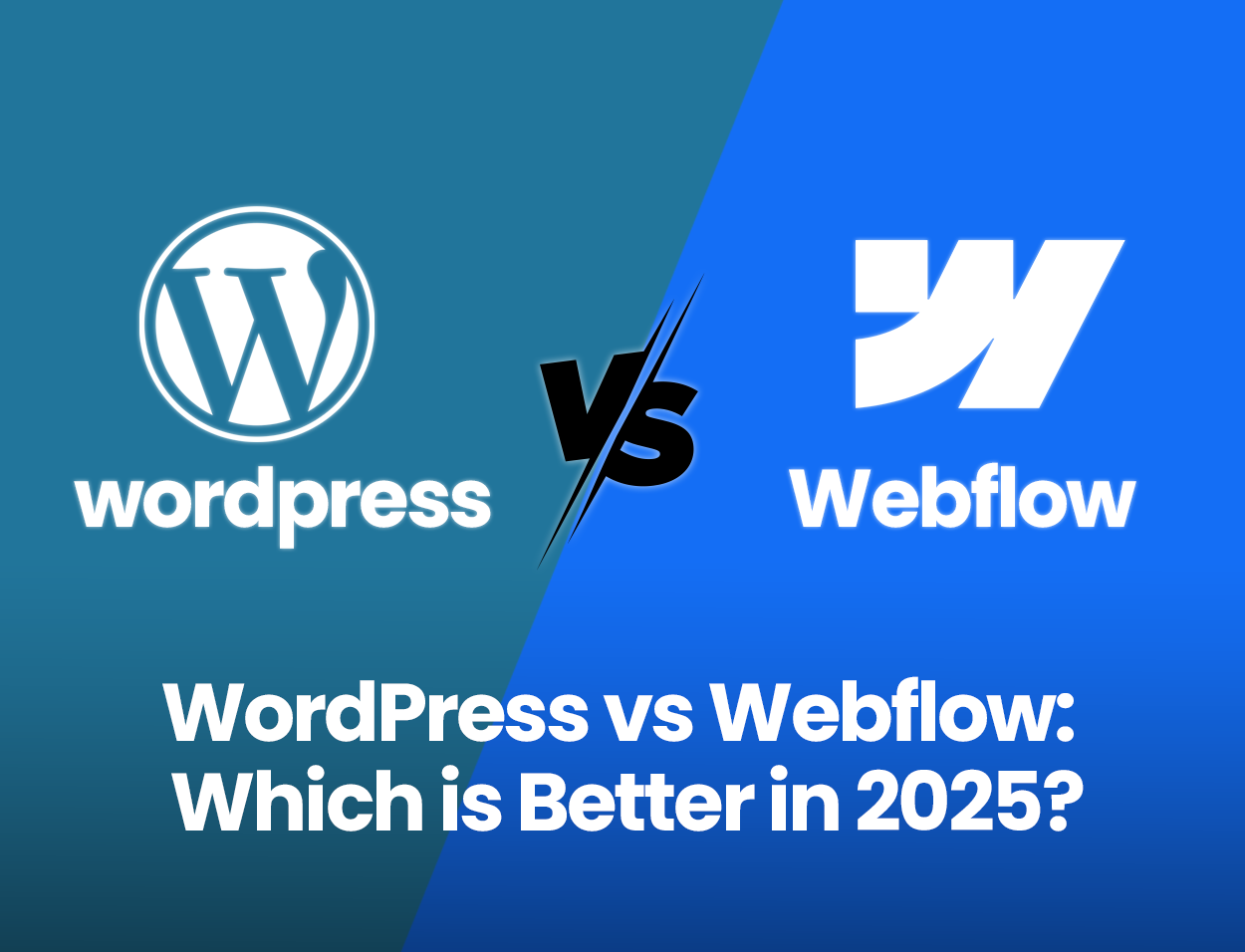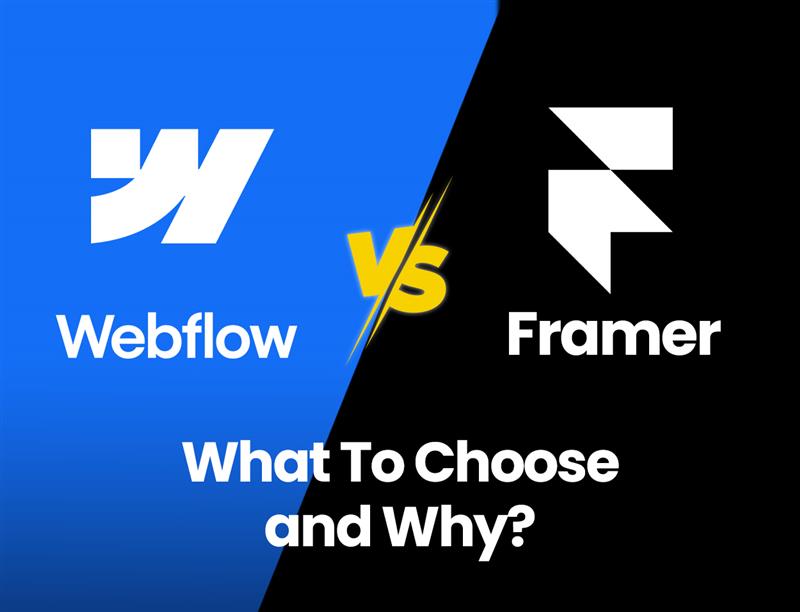Have you ever found yourself stuck in front of your screen, wondering whether WordPress or Webflow is the smarter pick for your website? Maybe you’re a startup founder planning your first site, or a growing business owner looking to upgrade from that clunky old theme.
You might even be a designer torn between the flexibility of WordPress and the slick UI of Webflow. With so much riding on your site’s design, SEO, and performance, how do you make the right call in 2025?
In a world where your website often makes the first impression, the CMS you choose could directly impact your sales, user retention, and even Google rankings.
Do you need something you can tweak endlessly, or would you rather have a clean visual editor that just works? Can you afford to compromise on security, page speed, or design flexibility?
This detailed comparison between WordPress and Webflow will help you cut through the noise and decide which platform truly supports your business goals in today’s ever-evolving digital landscape. Let’s dive in.
What is WordPress?
WordPress is an open-source CMS launched in 2003. It powers over 40% of websites globally, making it the most popular platform for blogs, corporate sites, and e-commerce platforms.
Key Features:
- Thousands of free and premium themes
- Extensive plugin ecosystem (over 59,000)
- Large community and support
- Compatible with WooCommerce for e-commerce
Best For:
- Bloggers
- Small to medium-sized businesses
- Customizable e-commerce stores
What is Webflow?
Webflow is a modern, visual website builder introduced in 2013. It allows designers to build responsive websites visually while generating clean HTML, CSS, and JavaScript.
Key Features:
- Visual drag-and-drop builder
- CMS capabilities without needing code
- Built-in hosting
- Powerful animation and interaction tools
Best For:
- Designers and freelancers
- Startups needing fast launch
- Agencies managing multiple client sites
8 Key Factors to Consider When Choosing Between WordPress and Webflow
1. Ease of Use
WordPress
While setup is straightforward, WordPress requires more manual configuration. Installing themes and plugins can be intuitive, but backend maintenance, plugin conflicts, and updates may challenge beginners.
Webflow
Offers a sleek, intuitive UI with visual editing. You can design directly on the page, which feels more accessible, especially for visual learners. However, there is a learning curve for those unfamiliar with design principles.
Verdict
If you prefer design-first workflows and minimal plugins, Webflow is easier. For a familiar, plugin-heavy ecosystem, WordPress holds the edge.
2. Design Flexibility
WordPress:
- Theme-based structure can limit creativity unless you custom-code or use a page builder (like Elementor or WPBakery).
- Many themes are bloated with unused features, which may slow down your site.
Webflow:
- Complete design freedom with CSS-like control.
- Built-in animations and interactions.
- Great for pixel-perfect design.
Verdict
Webflow wins if you’re after visual freedom without code. WordPress offers good options, but you’ll need third-party tools to reach the same flexibility.
3. SEO Capabilities
WordPress:
- SEO plugins like Yoast SEO and Rank Math give powerful control.
- Great content blogging tools.
- Offers server-side rendering and AMP plugins.
Webflow:
- Clean code and fast loading speeds
- Built-in SEO settings (meta tags, alt text, open graph)
- No need for external plugins
Verdict
A 2024 Backlinko report found that clean code and site speed are two of the top three ranking factors, making both platforms strong contenders. WordPress gives granular control with plugins, while Webflow offers cleaner code natively. Both are SEO-friendly, but Webflow requires less tweaking.
4. Scalability and Performance
WordPress:
- Scalable with the right hosting (e.g., Kinsta, SiteGround)
- Performance depends heavily on plugins and theme quality
Webflow:
- Hosted on AWS and Fastly CDN, ensuring fast global load times
- No need to worry about server management
Verdict
Webflow wins for performance consistency out of the box. WordPress can scale but requires expert management.
5. Security
WordPress:
- Regular updates but vulnerable due to plugin-based architecture
- Requires security plugins (like Wordfence or Sucuri)
Webflow:
- Closed environment
- SSL, backups, and security patches are managed automatically
Verdict
According to Sucuri, 90% of infected websites in 2024 were WordPress-based, mainly due to outdated plugins. Webflow offers stronger security with less effort.
6. E-commerce Capabilities
WordPress:
- WooCommerce is highly customizable
- Supports multiple payment gateways, subscriptions, and memberships
Webflow:
- Built-in e-commerce tools
- Visually integrated checkout
- Limited to fewer payment gateways compared to WooCommerce
Verdict
WordPress is better for complex e-commerce. Webflow works for simpler online stores.
7. Community and Support
WordPress:
- Large community with forums, YouTube tutorials, and meetups
- Freelancers and developers widely available
Webflow:
- Smaller community but growing fast
- Webflow University offers high-quality tutorials
Verdict
WordPress still leads in community support, but Webflow’s learning resources are more structured.
8. Pricing
WordPress:
- Free to use
- Costs include hosting (~INR 200–1000/month), premium themes/plugins
Webflow:
- Free starter plan
- Paid plans start at ~$14/month for basic websites
Verdict
WordPress is cheaper upfront. Webflow includes hosting, which may justify the cost.
Final Verdict: Which Should You Choose in 2025?
Choose WordPress if:
- You need a blog-heavy website
- Budget is a concern
- You want a wide choice of plugins and themes
Choose Webflow if:
- Design precision and visual editing are your priority
- You want performance and security without plugins
- You’re building a modern marketing or business site
Ready to Build Smarter?
Whether you’re starting your first website or upgrading your current one, the right CMS makes all the difference. At RedCube Digital, we help businesses choose, build, and optimize their digital platforms with precision. Contact us today for a consultation and discover which platform is ideal for your next project.
Frequently Asked Questions (FAQs)
1. Is Webflow better than WordPress for SEO?
Both are strong. Webflow has clean code and fast loading speeds; WordPress offers robust plugins for deeper control.
2. Can I migrate from WordPress to Webflow easily?
Content migration is possible, but complex designs and plugin-based features need to be rebuilt manually.
3. Which platform is better for beginners?
Webflow is more intuitive for designers. WordPress has a lower learning curve for general users.
4. Is Webflow popular in India?
It’s gaining traction, especially among design agencies and startups.
5. Does Webflow support multi-language sites?
Yes, through third-party tools or the Webflow Localization feature (paid).



